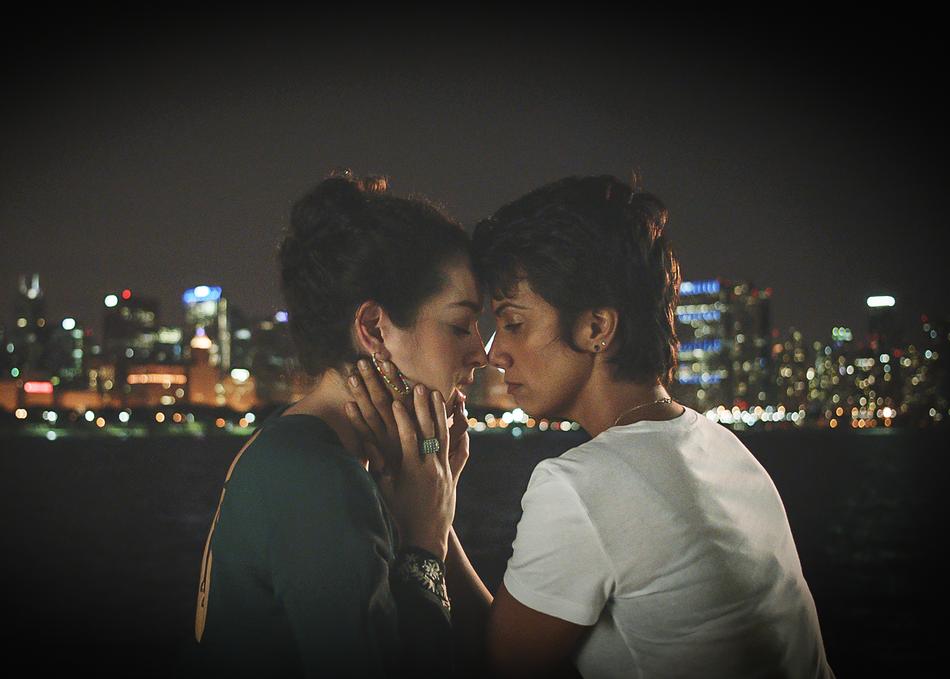By Mark Saldana
My next SXSW interview was with director Jennifer Reeder, writer/star Fawzia Mira, and actress Sari Sanchez from the delightful comedy Signature Move. Signature Move tells the story of Zaynab (Fawzia Mira), a Pakastani Muslim attorney who has been unlucky in love and must also attend to her devout and traditional mother Parveen (Shabana Azmi) who lives with her. Things get somewhat more complicated in Zaynab’s life when she meets and falls for Alma (Sari Sanchez), a Mexican-American lady who comes from a more liberal and progressive family.
The film beautifully celebrates both Pakastani and Mexican-American cultures and also offers an added cultural bonus, as Zaynab becomes interested in the world of lucha-style wrestling. The result is a refreshing and effervescent comedy full of romance, heart, and joire de vivre.
It was with much joy that I sat with Jennifer, Fawzia, and Sari to discuss the film, the topics of cultural differences, cultural similarities, and how Fawzia’s real life experiences inspired this sweet and funny movie.
Mark: Your film is about relationships, both familial and romantic. Some people might label it as a romantic comedy, but I feel that describes only part of the story. In dealing with the romantic and comedic elements of the story, did you find it challenging to avoid certain “rom-com” cliches often found in similar films?
Fawzia Mira: I am probably a terrible person when it comes to thinking about tropes. I just came in as someone who wanted to write about things that I saw or know or liked. In that respect, I wasn’t thinking about tropes, per say, but I also feel that when two people meet and there’s a connection, may be that’s a trope, but it’s beautiful. I also feel that the people and the characters in the film–you just don’t really see these folks. The way the Mexican woman and the Pakistani woman are connecting, There is that idea of the girl coming over and the mom not liking her, but that’s real. That’s a real thing that happens. I don’t know if there was any intention of avoiding tropes, but just telling some stories that are real.
Mark: Fawzia, you and Lisa Donato wrote this film. So, I take it that this is based on your personal experiences.
Fawzia: I would say that the film is inspired by real moments and real characters. The mother character is inspired by my mother, inspired by other South Asian mothers I know, inspired by non-South Asian immigrant mothers I know. Alma is inspired by my ex-girlfriend. When we started dating in Chicago, we found all of these connections across love and culture–mothers, colloquialisms, food, and just respect for family and tradition.
Mark: Fawzia, is Lucha wrestling an actual interest of yours, and if so, did your development of that interest happen pretty much like it does in the film?
Fawzia: The wrestling is not actually inspired by me being a wrestler. That was inspired by the fact that I met a real WW wrestler and she did her “signature move” on a show I was on. I just wondered how her world and wrestlers could fit in the story. The wrestling is fascinating because it does draw another connection across two different communities. It plays with the fact that some people think there aren’t any commonalities, but they are really there if you’re willing to find them.
Mark: I noticed that actor Michael Shannon is a producer of the film. How did he get involved?
Jennifer Reeder: He’s a Chicago guy and he’s genuinely good friends with Brian and Jan Higgelke who are on the producing team. It is a small film in terms of budget, so at some point, you call in all of your favors and you call in favors from people who can, not only sort of lend financial support, but also lend their names to the project. It think it was really about bringing people aboard who are already wanted to be a part of or support a film that was about Chicago and he is a long-time Chicago guy.
Mark: Sari, as some who is Mexican-American, what has been your experience regarding negativity to people pursuing “non-traditional” lifestyles?
Sari Sanchez: My father came to this country when he was 21 or 22 years-old. He is one of eighteen children and he was the only one who came to the United States. Not every Mexican family is going to be cool with a son or daughter who is gay, but I think about my own family, and my dad would not care if I was blue, purple, or whatever, as long as I got an education and had opportunity. What is happening now in the administration (presidential) is very scary and makes this movie more relevant. For me to be a Mexican-American woman and to be able to tell a story about women and do what I want be what I want to be when my dad worked so hard and sacrificed so much for me to be in this country and get an education to be able to do this. From an artist standpoint, this project really speaks to me. I learned so much about South Asian culture and we’re not all that different.
Signature Move has one more SXSW screening, today (March 17), 5:30 p.m. at the Alamo Drafthouse South Lamar theater.
